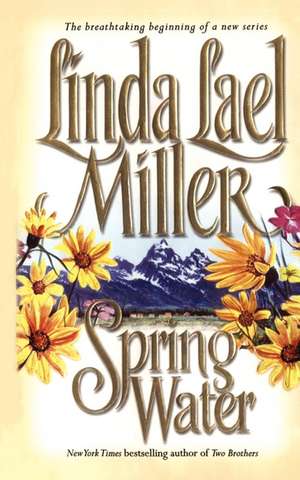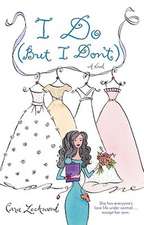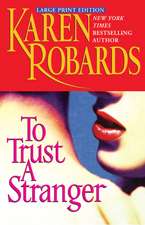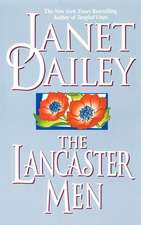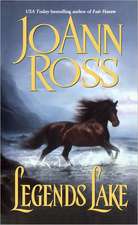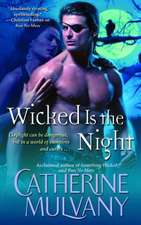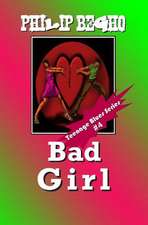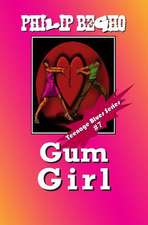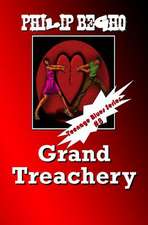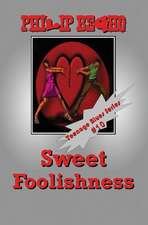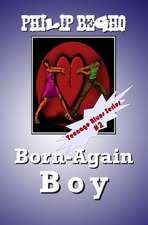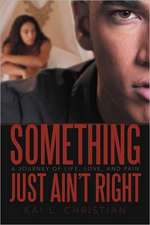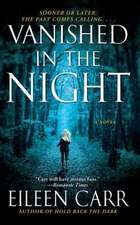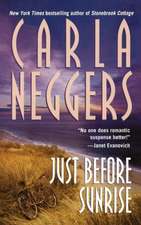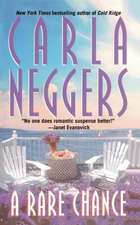Springwater
Autor Linda Lael Milleren Limba Engleză Paperback – 6 mai 2011
Scully Wainwright never intended to be left alone with his ranching partner's fiancée. But his partner's not due back until spring, and he can't leave a defenseless woman and her child unguarded -- not with wolves and Indians threatening. Biding his time with the lovely Evangeline begins to feel dangerously close to setting up a real home. But as a reckless passion sparks between them, Scully and Evangeline discover a destiny -- and a passion -- as boundless as the open frontier.
Preț: 113.73 lei
Nou
Puncte Express: 171
Preț estimativ în valută:
21.76€ • 22.72$ • 18.01£
21.76€ • 22.72$ • 18.01£
Carte disponibilă
Livrare economică 14-28 martie
Preluare comenzi: 021 569.72.76
Specificații
ISBN-13: 9781451646290
ISBN-10: 1451646291
Pagini: 304
Dimensiuni: 127 x 203 x 25 mm
Greutate: 0.28 kg
Ediția:11000
Editura: Gallery Books
Colecția Gallery Books
ISBN-10: 1451646291
Pagini: 304
Dimensiuni: 127 x 203 x 25 mm
Greutate: 0.28 kg
Ediția:11000
Editura: Gallery Books
Colecția Gallery Books
Extras
Chapter One
Montana Territory, 1870
She would never, in her long, long life, forget that first sight of him, riding through fresh snow high as the breast of his Appaloosa stallion, with the sky broad and ice blue at his back. Never forget those gleaming golden moments when she thought he was someone he was not.
Abigail, her six-year-old daughter, stood beside her at the window, perched on an upturned crate and peering through breath-fogged glass. "Look, Mama, he's come for us! I told you he would -- isn't he spectacular?"
Evangeline Keating bit her lower lip, tying to diffuse the swell of reckless anticipation and plain fear rising within her. The rider was indeed "spectacular," at least in build; his shoulders looked muscular and broad under his fleece-lined leather coat, his legs were long and straight, and he handled the reins with an easy grace that testified to a deep affinity with horses.
She could not make out his features, nor the color of his hair, for he wore a battered hat, pulled down low over his face, no doubt as a protection against the cold wind of that morning when a heavy snow had arrived early, catching the landscape by surprise.
She didn't really need to see him clearly, for she carried his likeness in her reticule, and had studied it over and over again. "Spectacular," Evangeline echoed at last. She was thinking of what would be expected of her, once the ceremony had been performed, and almost, but not quite, regretting her decision to come west and marry Mr. John Keating, her late husband's prosperous cousin. It wasn't as though she'd had any real choice, after all. Charles had left her with nothing, willing his farm and other assets to his son, Mott, conceived of his first, true and sainted wife, Clara.
Mott had expected to inherit Evangeline, along with the property and his father's money, a prospect that still caused her to shudder whenever the thought overtook her in an unguarded moment. Their small Pennsylvania town had been depleted of eligible men, as had the surrounding countryside, owing to the ravages of the late and tragic conflict of arms, and Evangeline, left with no honorable means of support, was desperate to marry.
Just when she'd begun to fret that she would have to give in and accept Mott Keating as a mate -- his father, at least, had been a mild-tempered man, if not precisely kind -- the letter had arrived. Mr. John Keating, a lonely but well-situated rancher, wrote to extend his condolences. He also enclosed a murky tintype of himself and a bank draft of not inconsiderable size, made out to Evangeline.
If she cared to make the journey west, he stated, he would marry her and raise her daughter as his own. He claimed to be an easy-going man, God-fearing, with simple wants and expectations. He had been among the first to drive cattle up from Texas, and there was a good, sturdy house on his property, one that wouldn't let in the rain. He had a fine and trustworthy partner, who kept mostly to himself. The work was hard, he admitted, and the ranch was a lonely place, there being few folks about. There were virtually no women, no schools as yet, and no churches, although Mr. Jacob McCaffrey, who, with his wife, June-bug, ran the Springwater station, a stagecoach stop some ten miles away, could be persuaded to preach a sermon now and again.
Evangeline had packed her and Abigail's few belongings into a single trunk, and ridden the railroads from Philadelphia to St. Paul, where they had boarded the first of numerous stagecoaches, traveling across the Nebraska and Montana Territories. The journey had taken weeks, calling upon every personal resource of courage, stamina and persistence Evangeline possessed. Only hours ahead of last night's blizzard, exhausted, hungry and cold to the marrow of their bones, mother and daughter had at last reached the Springwater station, where the McCaffreys, had made them welcome.
The rider gained the barn, dismounted and, after dragging open the door, led the puffing horse inside. In a few minutes, he came out again, blowing clouds as he slogged toward the station. When he raised his head and saw Evangeline and Abigail at the window, a grin flashed across his face, as dazzling, in its own way, as the sun-washed snow.
Evangeline stepped back quickly, reached up to touch her hair, which was an unremarkable shade of blonde, by her reckoning, but very neatly tended. She was, at her own assessment, neither plain nor pretty, with her tall, sturdy frame and strong hands. She had brown eyes, good teeth, healthy skin, and a shy, rare smile. She knew how to work, she was honest, and she was smart with numbers and words. She could grow vegetables, raise chickens, milk cows, keep a clean house, cook and sew. All in all, she was quite adequate as wife material.
She shook out the skirts of her blue calico dress, musty from so many weeks closed up in the travel trunk, and when she looked up, her gaze collided with that of June-bug McCaffrey, a small, gracious woman with a compassionate manner.
Mrs. McCaffrey glanced at her husband, Jacob, who was seated near the natural-rock fireplace, mending a harness. He was a gentle soul, impressive in size, with a somber expression and a head full of dark hair.
"Now, June-bug," he said quietly, "don't go interferin' in this."
Evangeline had almost worked up the nerve to ask what he meant -- it wasn't the first such exchange between the two since she'd arrived and stated her intention to marry John Keating -- when there was a thunderous knock at the heavy door, only briefly preceding a rush of winter air and the entrance of the tall man she expected to marry. Behind her, Abigail, who hoped for a pony of her own, not to mention a father, fairly jumped up and down with excitement.
Evangeline might have introduced herself, indeed, she was just stepping forward to do so, when the newcomer swept off his hat, revealing a head of fair, sun-streaked hair. His finely made face was ruddy with cold, and the look in his eyes, a bright blue green, was at once curious and amused, chagrined and bold.
Evangeline's stomach, wedged into her throat only a moment before, plummeted back into its rightful place, landing with a sickening lurch. "You're not Mr. Keating," she managed.
He studied her for what seemed like a long time, his expression unreadable. Then, at last, he replied. 'No, ma'am," he said simply. "I'm not."
While Evangeline was absorbing his announcement -- Abigail, hovering at the edge of her vision, was still at last -- the man held his hat in both hands and nodded to the McCaffreys. "Jacob," he said, by way of acknowledgment "Miss June-bug."
"You'll want some hot coffee, after a ride like that," June-bug decreed, bustling between the three trestle tables set out for the service of guests, with the stove as her intended destination. She was trim, with brown hair only faintly touched with gray, radiant skin, and eyes of an intense blue. "Some breakfast, too, I'll bet. You sit yourself down."
Evangeline stood stock still, afraid to move or speak. The man might well be an emissary for her future husband, but an inner sense, coupled with the odd glances the McCaffreys had been passing back and forth, told her that something was very wrong.
Mr. McCaffrey, ever the gentleman, set his harnesses aside and stood, running his broad, work roughened hands down the sides of his black woolen trousers. "Mrs. Keating," he said, after clearing his throat once, "this here is Scully Wainwright. He's partners with Big John, there at the Circle JW. Scully, this is Mrs. Keating."
Woodenly, Evangeline put out a hand. Wainwright hesitated, then wrenched off his heavy leather gloves and reciprocated. "Mrs. Keating," he said. There was a steadiness in him that ran deep, she sensed that right away, and despite a slight twitch in his jawline, he didn't once try to skirt her gaze.
"I was expecting my future husband," she said. No sense in beating round the bush, Evangeline thought.
He sighed, thrust a hand through his wild-man hair. Whoever he was, he needed tending to; his beard was growing in, his hair was shaggy and up close she could see that his shirt-collar wanted turning. No doubt he had holes in the heels and toes of his socks, too.
"You better tell her straight out," Jacob said, taking Wainwright's coat and moving away. There was in Jacob's manner something of a man who has just flung a handful of gunpowder into a bonfire.
"I was hoping you would have done that already," came the rueful answer. Scully didn't look away from Evangeline as he spoke, but she could tell he wanted to, nonetheless.
Abigail had come forward now, to stand just behind Evangeline, clutching her mother's skirts with small, strong hands.
Jacob took up a place beside June-bug, at the other end of the long room, with its exposed beams, spotless tables and plank floors. They conferred quietly as they worked at busy, invented tasks, and made a point of paying no attention to the drama unfolding just out of earshot.
Wainwright gave another sigh. "Big John isn't here. Right now, it's just me, the ranch, and a few cattle," he said, all in one breath.
Evangeline considered what it would mean to journey back to Pennsylvania, persuade the scorned Mott to marry her after all, and felt her courage wane with such swiftness that she had to sit down on the bench beside the nearest table. Abigail clung to her even more fiercely now, all her attention fixed on the towering form of Scully Wainwright.
He must have looked like a giant to the little girl; even to Evangeline, he was Goliath. The obvious fact that he was the most reluctant of messengers made no difference. It appeared that she and Abigail had traveled a long, hard road for nothing.
"What," Evangeline forced herself to begin, "do you mean, Mr. Keating isn't here? He wrote to me, proposing matrimony. He sent a bank draft..."
Wainwright sat down at the end of the bench, straddling it, resting one elbow on the table. June-bug approached, set a steaming cup of coffee down beside him, and scurried away again. "Yes, ma'am, I know all that. But he had to head south on some business, and it took longer than expected. He won't be back till spring, most likely, with the trails the way they are."
Evangeline well knew the state of the trails. The stage that had brought her to Springwater station had barely made it through, after all, and though the driver had pressed on toward the next stop after taking a hot meat and helping Jacob hitch up a fresh team, there was no telling when another coach would come through. According to the McCaffreys, it could be weeks, if the weather didn't turn.
She hiked her chin up a notch, refusing to let her emotions show, lest it seem like some sort of concession. Except for Abigail, and her dignity, she had nothing at all. "What, may I ask, are we supposed to do with ourselves in the meantime?"
The broad shoulders moved in an easy shrug, but Mr. Wainwright did avert his gaze for a moment. "I reckon you ought to come to the ranch with me, ma'am. You can settle in there, and carry on with the wedding when Big John gets home in the spring."
Evangeline was both relieved and horrified, having gotten the distinct impression that Mr. Wainwright had been living and working alone on the Circle JW since his partner's departure. It was one thing to have a place to go, and quite another to share a domicile with a stranger, and a mate one, at that.
Abigail, uncharacteristically silent until then, peered around Evangeline's hip and inquired, "May I have a pony? I'd like a spotted one, though any color would do."
Wainwright smiled at that, and in so doing struck a chord somewhere inside Evangeline. The resulting emotional sensations, resonating within her like just strummed harp strings, seemed better left unexamined. "Snow's pretty deep," he replied. "All the same, there might be a yearling you could ride."
"Thank you," Abigail said solemnly, stepping for ward now and extending her small hand, as if to seat the bargain. She seemed impossibly delicate, with her birdlike bones, enormous china blue eyes, and pale skin, contrasted by midnight-dark ringlets, but in this case appearances were indeed deceptive. Abigail was country-bred, and despite her prim little dress and doll-like aspect, she was as vary and agile as any boy alive, and just as mischievous. Within her daughter's small breast, Evangeline thought, with mingled pride and consternation, beat the heart of a ruffian and a rascal.
Evangeline took a gentle hold on her daughter's hand and drew her back, though the bargain had clearly already been struck. There would be a pony for Abigail. That, Evangeline supposed, was some consolation, at least.
"I'm not sure this is proper," she said, looking hard at Mr. Wainwright. His face was sun-bronzed, which only enhanced the turquoise shade of his eyes and made his straight white teeth seem even whiter. "Unless, of course, you are a married man. If your wife were present..."
"No wife," he interrupted, and took a leisurely sip from the coffee June-bug had provided. There was no sign of the McCaffreys now, though their voices could be heard from the small storeroom off the kitchen area, raised in what sounded like an amiable argument. "But I can live in the tack room out in the barn, and Jacob and Miss June-bug will warrant that I'm not the sort to force..." Here, he glanced at Abigail, and had the good grace to blush a little, beneath that deep tan of his. "I am a gentleman, in all respects that ought to concern you, Mrs. Keating."
Evangeline believed him, even after all her confrontations and near misses with Mott, which had left her somewhat wary of men. Over the eight years of her marriage to Charles, however, she had cultivated her intuition, which told her that Wainwright presented no physical danger to her, or to Abigail. This was not to say that he was tame; everything in his manner and bearing indicated that he was as wild as the wolves and cougars stalking the foothills of this treacherous, uncivilized and incomprehensibly beautiful country.
Evangeline had no viable alternatives. Even if another coach came through, she hadn't nearly enough money left to buy passage all the way back to Pennsylvania. Mott would send funds, if she wrote to him contritely, but that would take months and besides, he would want her soul in return, as well as her body. Nor could she rightly impose further upon the hospitality of the McCaffreys. They had been kind, even generous, but it simply was not their responsibility to look after stranded women and their children.
That left traveling to the Circle JW and settling in to wait for Mr. Keating to return from whence he'd gone. At least, she thought gamely, she would not have to change her name when she remarried. Abigail would have a warm, safe home and, presumably, plenty to eat. And the prospect of having an entire winter to prepare herself for the duties of a wife was not without a certain appeal.
If indeed she could trust Mr. Wainwright -- an impression she would most certainly verify with the McCaffreys before leaving the station -- the arrangement might be considered a blessing, heaven-sent.
"How," she began, "would we make this journey? I noticed that you only brought one horse."
Wainwright smiled, as though she'd said something humorous. "Jacob has a sleigh. We could borrow that, along with a couple of mules. It'll be a long, cold trip, though, so you'll want to bundle yourself and the little girl up real warm."
"Are there wolves along the way?" Abigail asked. Her eyes, large in any event, were the size of stove lids. Evangeline wondered if her daughter had somehow picked up on her own private comparisons between Wainwright and those fierce predators roaming the woodlands and plains.
"They won't bother us," Mr. Wainwright answered confidently, laying an idle hand to the holstered .45 resting against his right thigh. It was the first time Evangeline had noticed that he was armed, and she did not know whether to be reassured or frightened. She did not like guns but at the same time she understood that they were something of a necessity out here, where wild animals, bandits and hostile Indians were not uncommon.
"You'd shoot them?" Abigail asked.
"I wouldn't like to," Wainwright admitted. "But if the situation called for it, I reckon I'd rather the critter died than me."
That answer seemed to satisfy Abigail. She sat on the bench beside the next table, letting her tiny feet swing while she pondered the adventures that surely lay ahead. Other children might have nightmares after such talk, but Abigail had the soul of an explorer and would no doubt be gravely disappointed if she grew to adulthood without encountering at least one life-threatening situation.
Evangeline suppressed a shiver. If left to her own devices, she would have chosen to remain in Pennsylvania, war-torn as it was, living out her days in peace, working hard at a good man's side, raising Abigail, bearing other children. It still amazed her to find herself starting over, in this new and foreign place, far from everything she'd known. She missed the rolling hills and gentle fields of home very sorely in those moments.
Mr. Wainwright read her expression with uncanny accuracy. "This is hard country, ma'am," he said "but it's a fine place to live. Lots of elbow room. All it takes is some gumption and hard work."
Evangeline figured she had as much "gumption" as anybody, and God knew she was no stranger to hard work, but she didn't delude herself that the West held the same promise for a woman that it did for a man. She was simply trying to make the best of a difficult situation. Hearing Mrs. McCaffrey clattering pots and pans at the cookstove, she excused herself and crossed the room.
June-bug was humming an old hymn as she measured lard into a large skillet, preparatory to frying chicken. A kettle brimming with water and freshly peeled potatoes sat on the back of the stove, just beginning to bubble.
Evangeline glanced in Wainwright's direction, saw that he was watching her with a half grin, and turned her back on him.
"Is it safe to travel with that man?" she asked of Mrs. McCaffrey, in a whisper.
June-bug smiled warmly. "Scully? Why, he's as good as they get. He'll look after you and the little girl right enough. You've got nothin' to fear from him."
Evangeline folded her arms. "Why didn't you tell me when I first arrived that Mr. Keating had gone to Denver? You must have known."
Mrs. McCaffrey began dropping pieces of well-seasoned and flour-coated chicken into the pan. "Me and Jacob discussed it," she admitted, with an air of benign chagrin, "but you was froze plum through and tuckered out from the stagecoach ride when you got here last night. We just didn't have the heart to say nothin' about it. Besides, we knew Scully would come to fetch you home."
"He's a friend of yours, then? Scully, I mean?"
June-bug nodded fondly. "Like a son, really," she confirmed, reaching for a jar of green beans, already opened, and upending the contents into a smaller kettle. "We've known Scully ever since we come out here to run the station." Her smile faded a little, and her voice got smaller. "Our own two boys got themselves kilt at Chattanooga."
Evangeline was silent, absorbing the magnitude of the loss the McCaffreys had suffered. So many sons, fathers, brothers and husbands had perished, Union and Confederate alike. To distract herself from the vast, overwhelming sorrow of it, she stole another look at Scully Wainwright, who was talking with Jacob, now seated across the table from him. Abigail perched on the bench beside Scully, enraptured.
"What about Mr. Keating? What's he like?" She hadn't dared ask until then; she'd been too frightened of the answer. Suppose he was a whiskey-drinking man with lascivious ways? Suppose he beat her or -- she'd kill him -- Abigail?"
Mrs. McCaffrey smiled again, though remembrances of her lost sons lingered visibly in her eyes. "He's real decent. Older'n Scully, by twenty years or so, o'course. They've got a good-sized piece of land over there and a fine log house, too. Sold a whole passel of cattle to the army last fall and made themselves a pile of money. I reckon Big John means to bring more livestock with him when he comes back up from Mexico, to build up another herd."
With the chicken sizzling and the potatoes boiling, June-bug picked up the blue enamel coffeepot and carried it to the table where the men sat. Evangeline followed, having no real reason to stay behind. She'd spend much of the rest of her life watching food cook, she figured, and there was no point in using her time that way before the fact.
"You ought to stay the night, Scully," June-bug said, refilling her guest's cup and then her husband's. "Ten miles is a long way to travel, especially in weather like this. 'Sides that, Mrs. Keating and the little girl done wore themselves out, comin' all the way from Pennsylvania like they did."
Scully cast an assessing glance at the window. "You're right about the weather," he agreed, evidently discounting the strain on Evangeline and Abigail, "but I hate to leave the stock alone that long. There's been some stealin' lately."
Jacob arched one bristly black eyebrow. "Indians?"
Abigail leaned forward with even greater interest than before. "Real Indians?" she asked, in a breathless whisper, and with relish. "The kind that take scalps?"
"Abigail!" Evangeline scolded. Young as the child was, she knew a fair share of horror stories. No doubt she'd learned them from her much older half-brother, Mott, who'd probably hoped to scare both mother and daughter into staying on at the farm.
Scully, privy to none of these reflections, of course, merely nodded. "That happens now and again," he confirmed. "Still," he went on, speaking to Jacob, "I can't help feeling sorry for the poor devils. Game's sure to be harder to come by, with winter coming on so early this year, and they've got to fight the wolves and mountain lions for every jack-rabbit and possum. The deer don't make much of a meal, either, all ribs and gristle the way they are."
Despite her private fears of being scalped or captured by savages, Evangeline was struck by the compassion Mr. Wainwright showed for the Indians; on the train ride west, and on the string of stagecoaches after that, she'd heard other men say they ought to exterminate the red man once and for all and make the trails safe for decent folk.
"Time I get home, I'll be lucky to have a single hen left," he added.
Reminded of poultry, June-bug went back to the stove to keep an eye on the midday meal. Within half an hour, she'd made biscuits and gravy to accompany the other dishes, and the smells were delectable enough to set Evangeline's stomach rumbling. On the trip, she had often gone without eating, lest she run out of money and have nothing to offer Abigail, and she was enjoying Mrs. McCaffrey's cooking greatly.
Evangeline set places for the five of them, at the table nearest the fire, while Jacob and Mr. Wainwright retreated to the barn to make sure the sleigh was fit for travel. By the time the men returned and washed up on the chilly little porch off the kitchen, it was two in the afternoon, and the light was already fading. She was grateful for another night in the warm safety of the Springwater station and well aware the next day's journey would be a trying one.
After dinner, Evangeline helped Mrs. McCaffrey with the dishes, while Jacob and Mr. Wainwright went outside again, to smoke and assess the weather. Abigail, full of good food and worn out from listening, had fallen asleep on a deacon's bench near the hearth.
"Do you ever feel lonely, way out here?" Evangeline asked, drying a plate.
Mrs. McCaffrey smiled and shook her head. "I've got my Jacob and the Lord when I want company, and things get mighty lively when the stagecoaches are running. I see different sorts of people all the time, and they've all got their stories to tell."
She wanted to ask about the McCaffreys' children, but the question seemed too personal. Westerners were private sorts, in Evangeline's judgment, with more than their share of secrets. "It scares me a little," she confessed. "The idea of being so alone, I mean."
June-bug favored her with another smile. "Bein' alone ain't necessarily bad, you know. A person can come to understand herself real well that way. Some folks pass their whole lives without learnin' a thing about their own minds and spirits, but out here, all you've got to do is pay attention."
"Pay attention," Evangeline repeated, distracted. Beyond the thick log walls of the stagecoach station, the first night cries of the wolves could be heard. Jacob and Scully, settled once again at one of the tables, were embroiled in a game of checkers, and neither of them so much as looked up.
Unexpectedly, June-bug patted her arm. "Here, now. Don't you be afeared. You'll be safe with Scully, you and your little one both. I ain't never seen a bear nor a wolf nor a Yankee that could get the better of him."
Evangeline was starting to feel better -- until the gist of what Mrs. McCaffrey had just said began to sink in. "He fought on the Confederate side?"
June-bug fairly glowed with pride. "'Deed he did," she replied. "Scully was a courier for General Robert E. Lee himself. "
The shadows inside the station seemed to deepen in that moment, although Evangeline was sure it was just a trick of the light. She studied Mr. Wainwright in profile as he reached out to draw a kerosene lamp closer to the board, removed the glass chimney, and struck a match. When the wick caught, he replaced the chimney, and he and Jacob went on with their checkers match.
Evangeline cleared her throat. "Coming from Pennsylvania and all, well, politically speaking -- "
"Never you mind," June-bug interrupted, patting Evangeline's hand. "You cain't help you was born a Yankee. Scully knows that, and he ain't likely to hold it against you." She frowned pensively. "As for Big John Keating, I don't rightly know where he stands on the question. Reckon he probably don't hold with neither side." She lowered her voice to a confidential whisper, as though imparting a profound secret. "He growed up in Texas. To his mind, that don't make him a Yankee or a Confederate, neither one. It makes him a Texan."
Only later, lying in bed with Abigail enjoying the profound sleep of the innocent beside her, would Evangeline's mind return to June-bug's statements. She had been thinking of Scully Wainwright throughout the evening, wondering if he was bitter toward Northerners for all the South had suffered during the
long and horrendous war. Wondering where he'd been raised, and in what sort of circumstances, and whether there had ever been a special woman in his life.
That she should have been pondering Big John Keating, who would be her husband in a few months, for better or for worse, for richer or for poorer, in sickness and in health, 'til death did them part, went without saying. All the same, she found herself far more interested in Scully Wainwright, the polite, quiet and wholly enigmatic man who had come to take her home.
Copyright © 1998 by Linda Lael Miller
Montana Territory, 1870
She would never, in her long, long life, forget that first sight of him, riding through fresh snow high as the breast of his Appaloosa stallion, with the sky broad and ice blue at his back. Never forget those gleaming golden moments when she thought he was someone he was not.
Abigail, her six-year-old daughter, stood beside her at the window, perched on an upturned crate and peering through breath-fogged glass. "Look, Mama, he's come for us! I told you he would -- isn't he spectacular?"
Evangeline Keating bit her lower lip, tying to diffuse the swell of reckless anticipation and plain fear rising within her. The rider was indeed "spectacular," at least in build; his shoulders looked muscular and broad under his fleece-lined leather coat, his legs were long and straight, and he handled the reins with an easy grace that testified to a deep affinity with horses.
She could not make out his features, nor the color of his hair, for he wore a battered hat, pulled down low over his face, no doubt as a protection against the cold wind of that morning when a heavy snow had arrived early, catching the landscape by surprise.
She didn't really need to see him clearly, for she carried his likeness in her reticule, and had studied it over and over again. "Spectacular," Evangeline echoed at last. She was thinking of what would be expected of her, once the ceremony had been performed, and almost, but not quite, regretting her decision to come west and marry Mr. John Keating, her late husband's prosperous cousin. It wasn't as though she'd had any real choice, after all. Charles had left her with nothing, willing his farm and other assets to his son, Mott, conceived of his first, true and sainted wife, Clara.
Mott had expected to inherit Evangeline, along with the property and his father's money, a prospect that still caused her to shudder whenever the thought overtook her in an unguarded moment. Their small Pennsylvania town had been depleted of eligible men, as had the surrounding countryside, owing to the ravages of the late and tragic conflict of arms, and Evangeline, left with no honorable means of support, was desperate to marry.
Just when she'd begun to fret that she would have to give in and accept Mott Keating as a mate -- his father, at least, had been a mild-tempered man, if not precisely kind -- the letter had arrived. Mr. John Keating, a lonely but well-situated rancher, wrote to extend his condolences. He also enclosed a murky tintype of himself and a bank draft of not inconsiderable size, made out to Evangeline.
If she cared to make the journey west, he stated, he would marry her and raise her daughter as his own. He claimed to be an easy-going man, God-fearing, with simple wants and expectations. He had been among the first to drive cattle up from Texas, and there was a good, sturdy house on his property, one that wouldn't let in the rain. He had a fine and trustworthy partner, who kept mostly to himself. The work was hard, he admitted, and the ranch was a lonely place, there being few folks about. There were virtually no women, no schools as yet, and no churches, although Mr. Jacob McCaffrey, who, with his wife, June-bug, ran the Springwater station, a stagecoach stop some ten miles away, could be persuaded to preach a sermon now and again.
Evangeline had packed her and Abigail's few belongings into a single trunk, and ridden the railroads from Philadelphia to St. Paul, where they had boarded the first of numerous stagecoaches, traveling across the Nebraska and Montana Territories. The journey had taken weeks, calling upon every personal resource of courage, stamina and persistence Evangeline possessed. Only hours ahead of last night's blizzard, exhausted, hungry and cold to the marrow of their bones, mother and daughter had at last reached the Springwater station, where the McCaffreys, had made them welcome.
The rider gained the barn, dismounted and, after dragging open the door, led the puffing horse inside. In a few minutes, he came out again, blowing clouds as he slogged toward the station. When he raised his head and saw Evangeline and Abigail at the window, a grin flashed across his face, as dazzling, in its own way, as the sun-washed snow.
Evangeline stepped back quickly, reached up to touch her hair, which was an unremarkable shade of blonde, by her reckoning, but very neatly tended. She was, at her own assessment, neither plain nor pretty, with her tall, sturdy frame and strong hands. She had brown eyes, good teeth, healthy skin, and a shy, rare smile. She knew how to work, she was honest, and she was smart with numbers and words. She could grow vegetables, raise chickens, milk cows, keep a clean house, cook and sew. All in all, she was quite adequate as wife material.
She shook out the skirts of her blue calico dress, musty from so many weeks closed up in the travel trunk, and when she looked up, her gaze collided with that of June-bug McCaffrey, a small, gracious woman with a compassionate manner.
Mrs. McCaffrey glanced at her husband, Jacob, who was seated near the natural-rock fireplace, mending a harness. He was a gentle soul, impressive in size, with a somber expression and a head full of dark hair.
"Now, June-bug," he said quietly, "don't go interferin' in this."
Evangeline had almost worked up the nerve to ask what he meant -- it wasn't the first such exchange between the two since she'd arrived and stated her intention to marry John Keating -- when there was a thunderous knock at the heavy door, only briefly preceding a rush of winter air and the entrance of the tall man she expected to marry. Behind her, Abigail, who hoped for a pony of her own, not to mention a father, fairly jumped up and down with excitement.
Evangeline might have introduced herself, indeed, she was just stepping forward to do so, when the newcomer swept off his hat, revealing a head of fair, sun-streaked hair. His finely made face was ruddy with cold, and the look in his eyes, a bright blue green, was at once curious and amused, chagrined and bold.
Evangeline's stomach, wedged into her throat only a moment before, plummeted back into its rightful place, landing with a sickening lurch. "You're not Mr. Keating," she managed.
He studied her for what seemed like a long time, his expression unreadable. Then, at last, he replied. 'No, ma'am," he said simply. "I'm not."
While Evangeline was absorbing his announcement -- Abigail, hovering at the edge of her vision, was still at last -- the man held his hat in both hands and nodded to the McCaffreys. "Jacob," he said, by way of acknowledgment "Miss June-bug."
"You'll want some hot coffee, after a ride like that," June-bug decreed, bustling between the three trestle tables set out for the service of guests, with the stove as her intended destination. She was trim, with brown hair only faintly touched with gray, radiant skin, and eyes of an intense blue. "Some breakfast, too, I'll bet. You sit yourself down."
Evangeline stood stock still, afraid to move or speak. The man might well be an emissary for her future husband, but an inner sense, coupled with the odd glances the McCaffreys had been passing back and forth, told her that something was very wrong.
Mr. McCaffrey, ever the gentleman, set his harnesses aside and stood, running his broad, work roughened hands down the sides of his black woolen trousers. "Mrs. Keating," he said, after clearing his throat once, "this here is Scully Wainwright. He's partners with Big John, there at the Circle JW. Scully, this is Mrs. Keating."
Woodenly, Evangeline put out a hand. Wainwright hesitated, then wrenched off his heavy leather gloves and reciprocated. "Mrs. Keating," he said. There was a steadiness in him that ran deep, she sensed that right away, and despite a slight twitch in his jawline, he didn't once try to skirt her gaze.
"I was expecting my future husband," she said. No sense in beating round the bush, Evangeline thought.
He sighed, thrust a hand through his wild-man hair. Whoever he was, he needed tending to; his beard was growing in, his hair was shaggy and up close she could see that his shirt-collar wanted turning. No doubt he had holes in the heels and toes of his socks, too.
"You better tell her straight out," Jacob said, taking Wainwright's coat and moving away. There was in Jacob's manner something of a man who has just flung a handful of gunpowder into a bonfire.
"I was hoping you would have done that already," came the rueful answer. Scully didn't look away from Evangeline as he spoke, but she could tell he wanted to, nonetheless.
Abigail had come forward now, to stand just behind Evangeline, clutching her mother's skirts with small, strong hands.
Jacob took up a place beside June-bug, at the other end of the long room, with its exposed beams, spotless tables and plank floors. They conferred quietly as they worked at busy, invented tasks, and made a point of paying no attention to the drama unfolding just out of earshot.
Wainwright gave another sigh. "Big John isn't here. Right now, it's just me, the ranch, and a few cattle," he said, all in one breath.
Evangeline considered what it would mean to journey back to Pennsylvania, persuade the scorned Mott to marry her after all, and felt her courage wane with such swiftness that she had to sit down on the bench beside the nearest table. Abigail clung to her even more fiercely now, all her attention fixed on the towering form of Scully Wainwright.
He must have looked like a giant to the little girl; even to Evangeline, he was Goliath. The obvious fact that he was the most reluctant of messengers made no difference. It appeared that she and Abigail had traveled a long, hard road for nothing.
"What," Evangeline forced herself to begin, "do you mean, Mr. Keating isn't here? He wrote to me, proposing matrimony. He sent a bank draft..."
Wainwright sat down at the end of the bench, straddling it, resting one elbow on the table. June-bug approached, set a steaming cup of coffee down beside him, and scurried away again. "Yes, ma'am, I know all that. But he had to head south on some business, and it took longer than expected. He won't be back till spring, most likely, with the trails the way they are."
Evangeline well knew the state of the trails. The stage that had brought her to Springwater station had barely made it through, after all, and though the driver had pressed on toward the next stop after taking a hot meat and helping Jacob hitch up a fresh team, there was no telling when another coach would come through. According to the McCaffreys, it could be weeks, if the weather didn't turn.
She hiked her chin up a notch, refusing to let her emotions show, lest it seem like some sort of concession. Except for Abigail, and her dignity, she had nothing at all. "What, may I ask, are we supposed to do with ourselves in the meantime?"
The broad shoulders moved in an easy shrug, but Mr. Wainwright did avert his gaze for a moment. "I reckon you ought to come to the ranch with me, ma'am. You can settle in there, and carry on with the wedding when Big John gets home in the spring."
Evangeline was both relieved and horrified, having gotten the distinct impression that Mr. Wainwright had been living and working alone on the Circle JW since his partner's departure. It was one thing to have a place to go, and quite another to share a domicile with a stranger, and a mate one, at that.
Abigail, uncharacteristically silent until then, peered around Evangeline's hip and inquired, "May I have a pony? I'd like a spotted one, though any color would do."
Wainwright smiled at that, and in so doing struck a chord somewhere inside Evangeline. The resulting emotional sensations, resonating within her like just strummed harp strings, seemed better left unexamined. "Snow's pretty deep," he replied. "All the same, there might be a yearling you could ride."
"Thank you," Abigail said solemnly, stepping for ward now and extending her small hand, as if to seat the bargain. She seemed impossibly delicate, with her birdlike bones, enormous china blue eyes, and pale skin, contrasted by midnight-dark ringlets, but in this case appearances were indeed deceptive. Abigail was country-bred, and despite her prim little dress and doll-like aspect, she was as vary and agile as any boy alive, and just as mischievous. Within her daughter's small breast, Evangeline thought, with mingled pride and consternation, beat the heart of a ruffian and a rascal.
Evangeline took a gentle hold on her daughter's hand and drew her back, though the bargain had clearly already been struck. There would be a pony for Abigail. That, Evangeline supposed, was some consolation, at least.
"I'm not sure this is proper," she said, looking hard at Mr. Wainwright. His face was sun-bronzed, which only enhanced the turquoise shade of his eyes and made his straight white teeth seem even whiter. "Unless, of course, you are a married man. If your wife were present..."
"No wife," he interrupted, and took a leisurely sip from the coffee June-bug had provided. There was no sign of the McCaffreys now, though their voices could be heard from the small storeroom off the kitchen area, raised in what sounded like an amiable argument. "But I can live in the tack room out in the barn, and Jacob and Miss June-bug will warrant that I'm not the sort to force..." Here, he glanced at Abigail, and had the good grace to blush a little, beneath that deep tan of his. "I am a gentleman, in all respects that ought to concern you, Mrs. Keating."
Evangeline believed him, even after all her confrontations and near misses with Mott, which had left her somewhat wary of men. Over the eight years of her marriage to Charles, however, she had cultivated her intuition, which told her that Wainwright presented no physical danger to her, or to Abigail. This was not to say that he was tame; everything in his manner and bearing indicated that he was as wild as the wolves and cougars stalking the foothills of this treacherous, uncivilized and incomprehensibly beautiful country.
Evangeline had no viable alternatives. Even if another coach came through, she hadn't nearly enough money left to buy passage all the way back to Pennsylvania. Mott would send funds, if she wrote to him contritely, but that would take months and besides, he would want her soul in return, as well as her body. Nor could she rightly impose further upon the hospitality of the McCaffreys. They had been kind, even generous, but it simply was not their responsibility to look after stranded women and their children.
That left traveling to the Circle JW and settling in to wait for Mr. Keating to return from whence he'd gone. At least, she thought gamely, she would not have to change her name when she remarried. Abigail would have a warm, safe home and, presumably, plenty to eat. And the prospect of having an entire winter to prepare herself for the duties of a wife was not without a certain appeal.
If indeed she could trust Mr. Wainwright -- an impression she would most certainly verify with the McCaffreys before leaving the station -- the arrangement might be considered a blessing, heaven-sent.
"How," she began, "would we make this journey? I noticed that you only brought one horse."
Wainwright smiled, as though she'd said something humorous. "Jacob has a sleigh. We could borrow that, along with a couple of mules. It'll be a long, cold trip, though, so you'll want to bundle yourself and the little girl up real warm."
"Are there wolves along the way?" Abigail asked. Her eyes, large in any event, were the size of stove lids. Evangeline wondered if her daughter had somehow picked up on her own private comparisons between Wainwright and those fierce predators roaming the woodlands and plains.
"They won't bother us," Mr. Wainwright answered confidently, laying an idle hand to the holstered .45 resting against his right thigh. It was the first time Evangeline had noticed that he was armed, and she did not know whether to be reassured or frightened. She did not like guns but at the same time she understood that they were something of a necessity out here, where wild animals, bandits and hostile Indians were not uncommon.
"You'd shoot them?" Abigail asked.
"I wouldn't like to," Wainwright admitted. "But if the situation called for it, I reckon I'd rather the critter died than me."
That answer seemed to satisfy Abigail. She sat on the bench beside the next table, letting her tiny feet swing while she pondered the adventures that surely lay ahead. Other children might have nightmares after such talk, but Abigail had the soul of an explorer and would no doubt be gravely disappointed if she grew to adulthood without encountering at least one life-threatening situation.
Evangeline suppressed a shiver. If left to her own devices, she would have chosen to remain in Pennsylvania, war-torn as it was, living out her days in peace, working hard at a good man's side, raising Abigail, bearing other children. It still amazed her to find herself starting over, in this new and foreign place, far from everything she'd known. She missed the rolling hills and gentle fields of home very sorely in those moments.
Mr. Wainwright read her expression with uncanny accuracy. "This is hard country, ma'am," he said "but it's a fine place to live. Lots of elbow room. All it takes is some gumption and hard work."
Evangeline figured she had as much "gumption" as anybody, and God knew she was no stranger to hard work, but she didn't delude herself that the West held the same promise for a woman that it did for a man. She was simply trying to make the best of a difficult situation. Hearing Mrs. McCaffrey clattering pots and pans at the cookstove, she excused herself and crossed the room.
June-bug was humming an old hymn as she measured lard into a large skillet, preparatory to frying chicken. A kettle brimming with water and freshly peeled potatoes sat on the back of the stove, just beginning to bubble.
Evangeline glanced in Wainwright's direction, saw that he was watching her with a half grin, and turned her back on him.
"Is it safe to travel with that man?" she asked of Mrs. McCaffrey, in a whisper.
June-bug smiled warmly. "Scully? Why, he's as good as they get. He'll look after you and the little girl right enough. You've got nothin' to fear from him."
Evangeline folded her arms. "Why didn't you tell me when I first arrived that Mr. Keating had gone to Denver? You must have known."
Mrs. McCaffrey began dropping pieces of well-seasoned and flour-coated chicken into the pan. "Me and Jacob discussed it," she admitted, with an air of benign chagrin, "but you was froze plum through and tuckered out from the stagecoach ride when you got here last night. We just didn't have the heart to say nothin' about it. Besides, we knew Scully would come to fetch you home."
"He's a friend of yours, then? Scully, I mean?"
June-bug nodded fondly. "Like a son, really," she confirmed, reaching for a jar of green beans, already opened, and upending the contents into a smaller kettle. "We've known Scully ever since we come out here to run the station." Her smile faded a little, and her voice got smaller. "Our own two boys got themselves kilt at Chattanooga."
Evangeline was silent, absorbing the magnitude of the loss the McCaffreys had suffered. So many sons, fathers, brothers and husbands had perished, Union and Confederate alike. To distract herself from the vast, overwhelming sorrow of it, she stole another look at Scully Wainwright, who was talking with Jacob, now seated across the table from him. Abigail perched on the bench beside Scully, enraptured.
"What about Mr. Keating? What's he like?" She hadn't dared ask until then; she'd been too frightened of the answer. Suppose he was a whiskey-drinking man with lascivious ways? Suppose he beat her or -- she'd kill him -- Abigail?"
Mrs. McCaffrey smiled again, though remembrances of her lost sons lingered visibly in her eyes. "He's real decent. Older'n Scully, by twenty years or so, o'course. They've got a good-sized piece of land over there and a fine log house, too. Sold a whole passel of cattle to the army last fall and made themselves a pile of money. I reckon Big John means to bring more livestock with him when he comes back up from Mexico, to build up another herd."
With the chicken sizzling and the potatoes boiling, June-bug picked up the blue enamel coffeepot and carried it to the table where the men sat. Evangeline followed, having no real reason to stay behind. She'd spend much of the rest of her life watching food cook, she figured, and there was no point in using her time that way before the fact.
"You ought to stay the night, Scully," June-bug said, refilling her guest's cup and then her husband's. "Ten miles is a long way to travel, especially in weather like this. 'Sides that, Mrs. Keating and the little girl done wore themselves out, comin' all the way from Pennsylvania like they did."
Scully cast an assessing glance at the window. "You're right about the weather," he agreed, evidently discounting the strain on Evangeline and Abigail, "but I hate to leave the stock alone that long. There's been some stealin' lately."
Jacob arched one bristly black eyebrow. "Indians?"
Abigail leaned forward with even greater interest than before. "Real Indians?" she asked, in a breathless whisper, and with relish. "The kind that take scalps?"
"Abigail!" Evangeline scolded. Young as the child was, she knew a fair share of horror stories. No doubt she'd learned them from her much older half-brother, Mott, who'd probably hoped to scare both mother and daughter into staying on at the farm.
Scully, privy to none of these reflections, of course, merely nodded. "That happens now and again," he confirmed. "Still," he went on, speaking to Jacob, "I can't help feeling sorry for the poor devils. Game's sure to be harder to come by, with winter coming on so early this year, and they've got to fight the wolves and mountain lions for every jack-rabbit and possum. The deer don't make much of a meal, either, all ribs and gristle the way they are."
Despite her private fears of being scalped or captured by savages, Evangeline was struck by the compassion Mr. Wainwright showed for the Indians; on the train ride west, and on the string of stagecoaches after that, she'd heard other men say they ought to exterminate the red man once and for all and make the trails safe for decent folk.
"Time I get home, I'll be lucky to have a single hen left," he added.
Reminded of poultry, June-bug went back to the stove to keep an eye on the midday meal. Within half an hour, she'd made biscuits and gravy to accompany the other dishes, and the smells were delectable enough to set Evangeline's stomach rumbling. On the trip, she had often gone without eating, lest she run out of money and have nothing to offer Abigail, and she was enjoying Mrs. McCaffrey's cooking greatly.
Evangeline set places for the five of them, at the table nearest the fire, while Jacob and Mr. Wainwright retreated to the barn to make sure the sleigh was fit for travel. By the time the men returned and washed up on the chilly little porch off the kitchen, it was two in the afternoon, and the light was already fading. She was grateful for another night in the warm safety of the Springwater station and well aware the next day's journey would be a trying one.
After dinner, Evangeline helped Mrs. McCaffrey with the dishes, while Jacob and Mr. Wainwright went outside again, to smoke and assess the weather. Abigail, full of good food and worn out from listening, had fallen asleep on a deacon's bench near the hearth.
"Do you ever feel lonely, way out here?" Evangeline asked, drying a plate.
Mrs. McCaffrey smiled and shook her head. "I've got my Jacob and the Lord when I want company, and things get mighty lively when the stagecoaches are running. I see different sorts of people all the time, and they've all got their stories to tell."
She wanted to ask about the McCaffreys' children, but the question seemed too personal. Westerners were private sorts, in Evangeline's judgment, with more than their share of secrets. "It scares me a little," she confessed. "The idea of being so alone, I mean."
June-bug favored her with another smile. "Bein' alone ain't necessarily bad, you know. A person can come to understand herself real well that way. Some folks pass their whole lives without learnin' a thing about their own minds and spirits, but out here, all you've got to do is pay attention."
"Pay attention," Evangeline repeated, distracted. Beyond the thick log walls of the stagecoach station, the first night cries of the wolves could be heard. Jacob and Scully, settled once again at one of the tables, were embroiled in a game of checkers, and neither of them so much as looked up.
Unexpectedly, June-bug patted her arm. "Here, now. Don't you be afeared. You'll be safe with Scully, you and your little one both. I ain't never seen a bear nor a wolf nor a Yankee that could get the better of him."
Evangeline was starting to feel better -- until the gist of what Mrs. McCaffrey had just said began to sink in. "He fought on the Confederate side?"
June-bug fairly glowed with pride. "'Deed he did," she replied. "Scully was a courier for General Robert E. Lee himself. "
The shadows inside the station seemed to deepen in that moment, although Evangeline was sure it was just a trick of the light. She studied Mr. Wainwright in profile as he reached out to draw a kerosene lamp closer to the board, removed the glass chimney, and struck a match. When the wick caught, he replaced the chimney, and he and Jacob went on with their checkers match.
Evangeline cleared her throat. "Coming from Pennsylvania and all, well, politically speaking -- "
"Never you mind," June-bug interrupted, patting Evangeline's hand. "You cain't help you was born a Yankee. Scully knows that, and he ain't likely to hold it against you." She frowned pensively. "As for Big John Keating, I don't rightly know where he stands on the question. Reckon he probably don't hold with neither side." She lowered her voice to a confidential whisper, as though imparting a profound secret. "He growed up in Texas. To his mind, that don't make him a Yankee or a Confederate, neither one. It makes him a Texan."
Only later, lying in bed with Abigail enjoying the profound sleep of the innocent beside her, would Evangeline's mind return to June-bug's statements. She had been thinking of Scully Wainwright throughout the evening, wondering if he was bitter toward Northerners for all the South had suffered during the
long and horrendous war. Wondering where he'd been raised, and in what sort of circumstances, and whether there had ever been a special woman in his life.
That she should have been pondering Big John Keating, who would be her husband in a few months, for better or for worse, for richer or for poorer, in sickness and in health, 'til death did them part, went without saying. All the same, she found herself far more interested in Scully Wainwright, the polite, quiet and wholly enigmatic man who had come to take her home.
Copyright © 1998 by Linda Lael Miller
Notă biografică
The daughter of a town marshal, Linda Lael Miller is a #1 New York Times and USA TODAY bestselling author of more than one hundred historical and contemporary novels, most of which reflect her love of the West. Raised in Northport, Washington, Linda pursued her wanderlust, living in London and Arizona and traveling the world before returning to the state of her birth to settle down on a horse property outside Spokane. Published since 1983, Linda was awarded the prestigious Nora Roberts Lifetime Achievement Award in 2007 by the Romance Writers of America. She was recently inducted into the Wild West Heritage Foundation's Walk of Fame for her dedication to preserving the heritage of the Wild West. When not writing, Linda loves to focus her creativity on a wide variety of art projects. Visit her online at LindaLaelMiller.com and Facebook.com/OfficialLindaLaelMiller.
